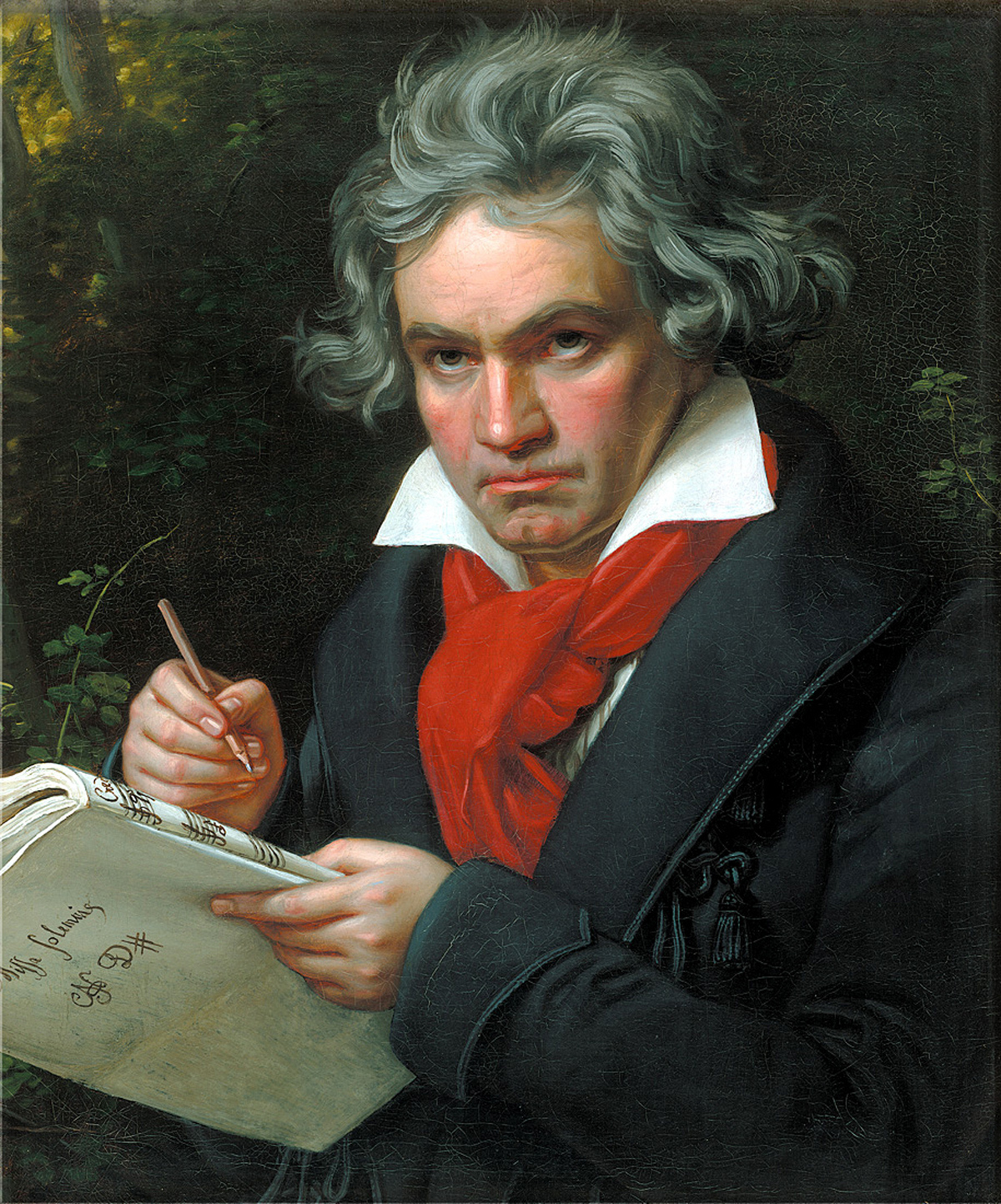1770
1770, December 16, Bonn: Born. Second child of Maria Magdalena and Johann van Beethoven, court singer.
1770, December 17, Bonn: Baptized
1775
1775, Bonn: Begins music lessons with his father, a severe and cruel teacher, who is said to have often beaten his son.
1778
1778, March 26, Köln: Performed his first public recital. Billed as a "little son of 6 years," (Mozart's age when he debuted for Empress Maria Theresia) although he was in fact 7, Beethoven played impressively, but his recital received no press whatsoever
1779
1779, Bonn: Took composition lessons with Chris Gottlieb Neefe
1781
1781, Bonn: Withdrew from school to study music full time with Christian Gottlob Neefe, the newly appointed Court Organist. Neefe introduced Beethoven to Johann Sebastian Bach.
1782
1782, Bonn: At the age of 12 Beethoven published his first composition, a set of piano variations on a theme by an obscure classical composer named Dressler.
1782, Bonn: Became Neefe's unsalaried assistant court organist
1782, Bonn: Formed close relationship with the Breuning family and with Franz Gerhard Wegeler.
1782, October-November, Holland: Traveled to Holland with his mother.
1783
1783, April, Bonn: Assumes some of Kapellmeister Andrea Lucchesi's duties as organist during Lucchesi's leave. He also replaces Neefe as cembalist at theatrical rehearsals.
1783, November 23, The Hague: Played at a concert at the court of Prince William of Orange-Nassau.
1784
1784, June, Bonn: Appointed deputy court organist, at a salary of 150 florins. The appointment had been recommended by court chamberlain Count Salm prior to Elector Maximilian Freidrich's death.
1785
1785, Bonn: Befriended Antoine Reicha, who moved to Bonn with his uncle Josef, cellist and appointment the leader of the court orchestra. Later, Reicha will state that he and Beethoven had been constant companions at Bonn and afterwards in Vienna, 'like Orestes and Pylades'.
1787
1787, March-May, Vienna: Travelled to Vienna, at his employer's expense, for the first time, apparently in the hope of studying with Mozart. He went via Munich, where he stayed on April 1 on the outward and on April 25 on the return journey. Returned quickly to Bonn after learning that his mom became ill.
1787, July, Bonn: His mother dies.
1788
1788, February 1, Bonn: Count Waldstein arrived in Bonn, where, on June 17, he was made a knight of the Teutonic Order. He was one of Beethoven's important early patrons; he later helped arrange Beethoven's study with Haydn in Vienna.
1789
1789, Bonn: Plays viola in court theater orchestra. The repertory include Mozart's "Die Entführung aus dem Serail", and in the second season (1790) "Le Nozze di Figaro" and "Don Giovanni".
1789, May 14: Matriculates at the University of Bonn, at the same time as Antoine Reicha.
1789, November 20, Bonn: Beethoven's father retires. It was decreed that one half of his 200-thaler salary should henceforth be paid to Beethoven for the support of his two younger brothers. (However, to keep up appearances, Johann van Beethoven will continue to draw his full salary, of which he than hands one-half to his son.)
1790
1790, February 20, Bonn: Emperor Joseph II died. When the news reaches Bonn, Beethoven is invited to set a text by Severin Anton Averdonk, for performance at a ceremony on March 19. However, his cantata (WoO 87) is not ready in time. He will later set another text by Averdonk to celebrate the elevation of his Joseph's brother Leopold to the rank of emperor (WoO 88).
1790, December 25, Bonn: Haydn and Johann Peter Salomon arrived at Bonn on their to London. The following day they dined with several of the city's leading musicians. It is not known if Beethoven was introduced to Haydn during this visit or in 1792.
1792
1793
1794
1795
1795, March 29, Vienna: He premiered his Piano Concerto No. 2, Op. 19 at Vienna's Burgtheater in a concert marking his public debut. Prior to that, he had performed only in the private salons of the Viennese nobility at Burgtheater
1796
1796: Prince Lichnowsky traveled to Prague, taking Beethoven with him. The composer was on his way to Berlin
1797
1798
1799
1800
1800-1806, Vienna: Lichnowsky gave Beethoven an annual allowance of 600 florins until such time as he found a regular appointment as a musician. The stipend continued until 1806, when a furious quarrel erupted between the two, terminating their friendship: Beethoven, staying at Lichnowsky's country estate, had refused to play for visiting French officers. Later, arriving home in Vienna, Beethoven smashed a bust of the Prince.
1801
1802
1802, April-October, Heiligenstadt: Tried to come to terms with his hearing condition. Here he wrote his Heiligenstadt Testament, dated October 6
1803
1803-1804, Vienna: Lived in rooms inside the theatre, at Schikaneder's invitation, during part of the period he was composing his opera Fidelio
1804
1805
1805: In a letter, the composer called him "one of my most loyal friends and promoters of my art."
1806
1807
1808
1808, December 22 18:30-22:30, Vienna: Beethoven held an Akademie which lasted about 4 hours, featuring the world premiere of Symphony No. 5 and 6, a piano fantasia, and his Choral Fantasy at Theater an der Wien
1809
1810
1811
1812
1812, July, Vienna: Over the course of two days, wrote Antonie Brentano a long and beautiful love letter that he never sent. Addressed "to you, my Immortal Beloved," the letter said in part, "My heart is full of so many things to say to you — ah — there are moments when I feel that speech amounts to nothing at all — Cheer up — remain my true, my only love, my all as I am yours."
1813
1814
1815
1816
1817
1818
1819
1820
1822
1823
1824
1825
1826
1827
1827, March 26, Vienna: Died
1827, March 29, Vienna: Buried

